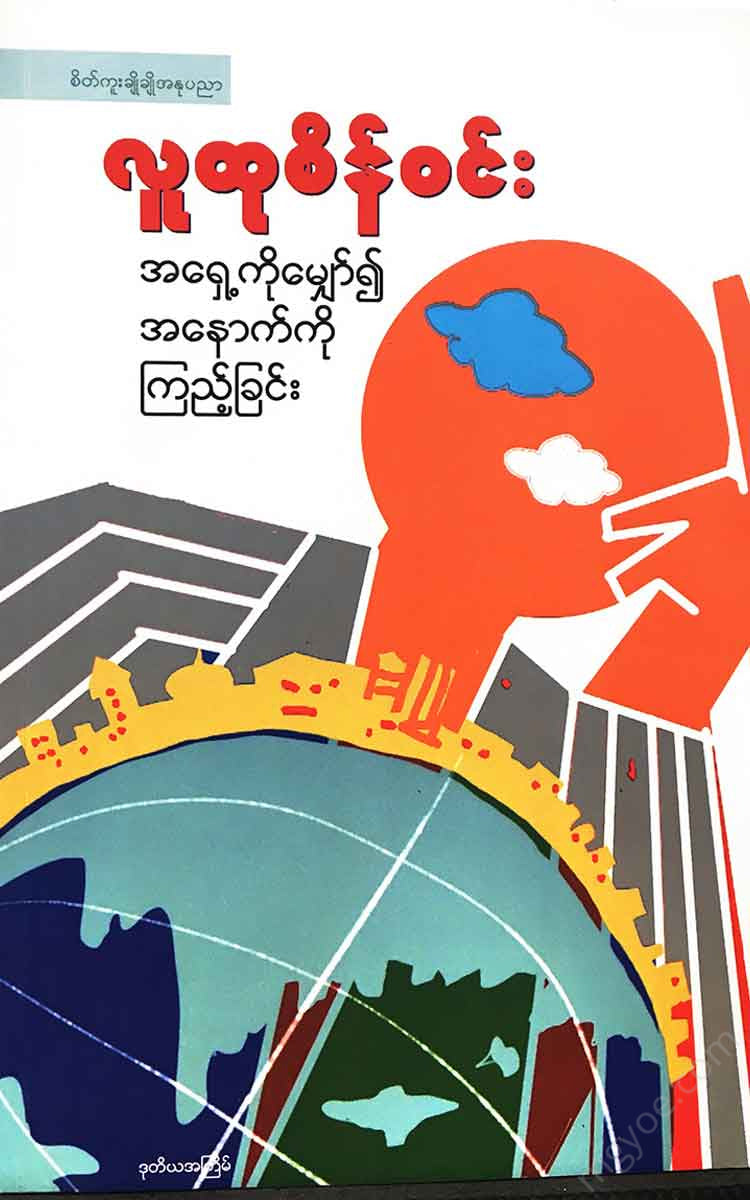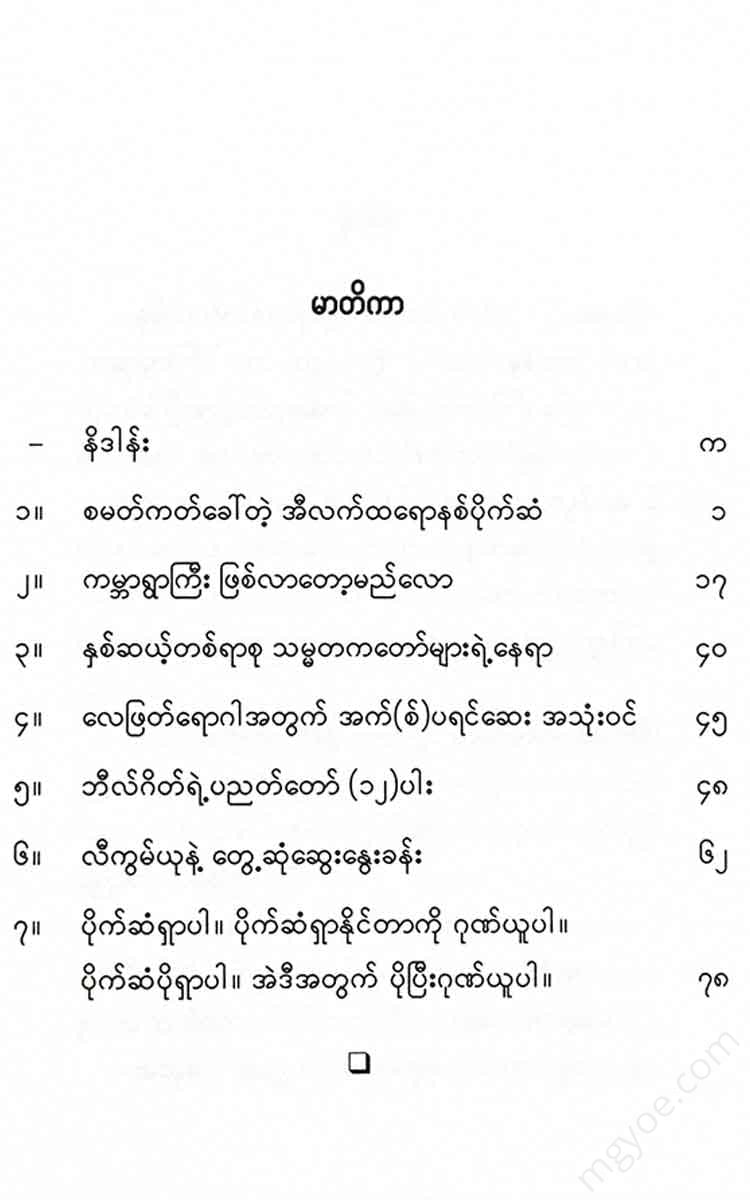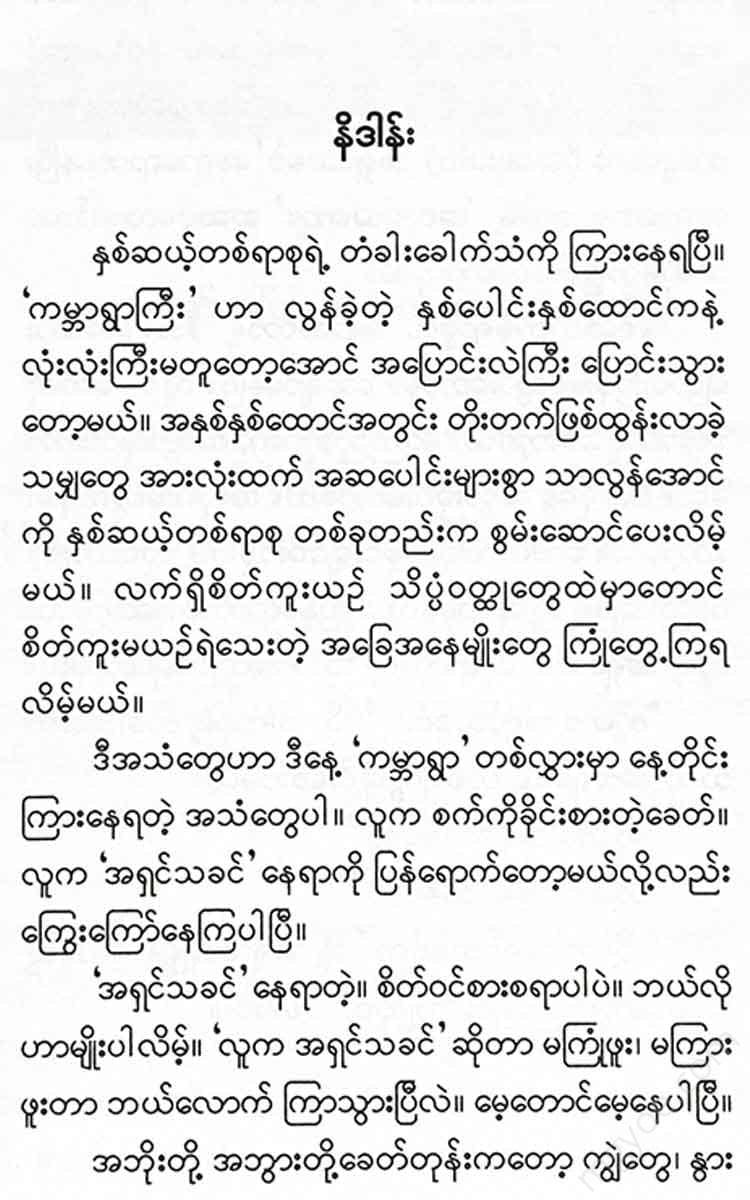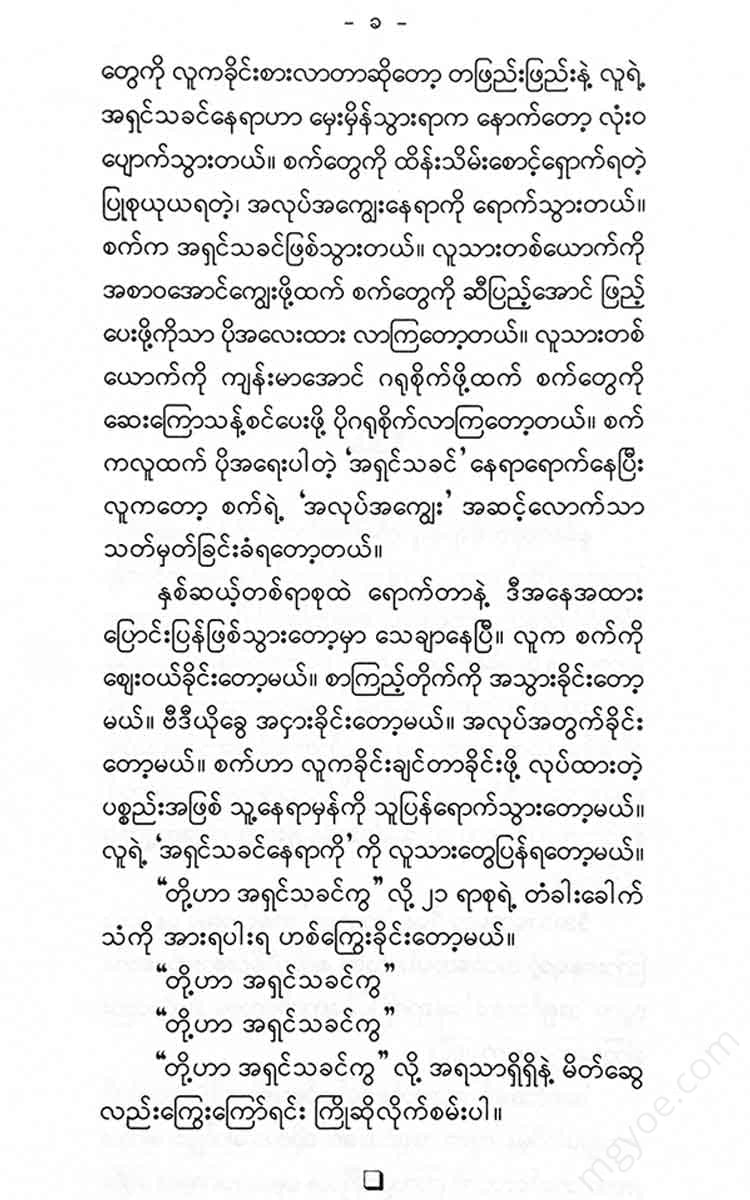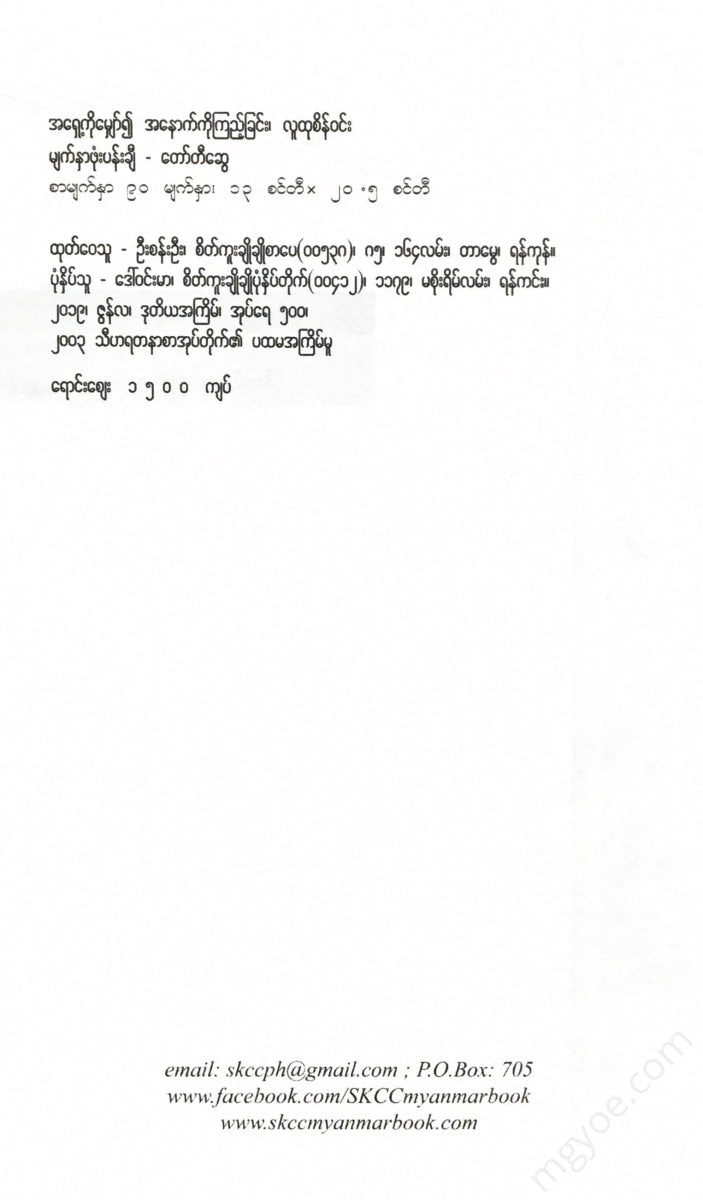စိတ်ကူးချိုချိုစာပေ
Lut Sein Win - Looking East, Looking West
Lut Sein Win - Looking East, Looking West
Couldn't load pickup availability
Electronic money called smart cards
As soon as you open the door to the 21st century, he will give you money. He will ask you to give him as much as you want, as much as you like. You can even take a lot of money with you. You don't have to worry about having to carry a bag or a place to put it. He won't bring you big bags. He will give you a small card, the size of a phone card, in your hand.
Then you won't hear the sound of coins in people's pockets anymore. You can buy anything you want with just a smart card. It can be used as a key to open the door of your house, a key to open the car door. Not only that, it can also be used as a driver's license, a health record. When traveling, you don't have to drag a big bag. Just put a smart card in your bag and go smartly.
Three-season clothing
Not only will it be convenient to travel, but it will also be very convenient to dress and eat. You will no longer need to buy different clothes for summer and winter. "Clothing made with smart yarn will provide warmth in winter and coolness in summer. In winter, large warm clothes are becoming bulky and deformed, so "smart clothes" will be coming to help people wear them smartly.
Would you choose your favorite actor or actress?
For movie lovers, if you don't like the characters in the movie you're watching, you can even replace them with your favorite actress. For example, if you're watching a movie starring Madonna and you think it would be great if Monroe were in the role, just press a button and Madonna's image will appear. The sound will be Monroe's voice.
Computer driver
Computer-controlled cars are being tested now. In the next century, you won't have to drive yourself. You'll get in the car and tell it where you want to go, and the computer will take control of the steering wheel and drive. It's said that it will be able to accelerate and decelerate, avoid collisions, overtake, and brake more safely than humans. It's possible. Computers won't get angry, get angry, or fall asleep like humans. At first, there will be special highways for computer-driven cars. But in the next phase, they say, they'll have to drive on ordinary roads. Then, the person will just sit in the car and watch a movie, ride a horse, or take a nap.
Good news for stroke victims
Among the various diseases that people suffer, stroke is one of the worst. A person who is in a good place suddenly collapses and is in a state of misery. It does not show any symptoms like other diseases. When you wake up, you will see your good person washing his face and combing his hair in front of the mirror. Or you may be lying in bed and your hands will become numb and you will not be able to move them, which will make you feel like you are half paralyzed. Sometimes, while doing something, you will suddenly faint and lose consciousness. When you regain consciousness, you will not be able to speak and will be left with a permanent disability.
One August morning in 1996, cardiologist Dr. Virendra Bister, 49, was doing his usual rounds at a hospital outside Chicago. A few minutes later, nurses found him leaning against a wall. “Are you okay?” they asked. He couldn’t answer. He could hear everything the nurses were saying. But he couldn’t answer. They immediately put him in a wheelchair and took him to the emergency room. The doctors diagnosed him with a stroke and rushed him to the stroke unit at the University of Illinois Hospital. They gave him a prescription for a drug. Within three hours of the drug, he was walking and even seeing his patients.
The drug that saved Dr. Bisler's life wasn't a new discovery. It was a drug called Tissue Plasminogen Activator, which he himself had been using for years to treat heart disease.
A stroke, commonly known as a heart attack, is a condition where a blood clot blocks a blood vessel in the brain, preventing it from getting enough oxygen-carrying blood. The brain cells in the area that doesn't get enough oxygen and blood die. When these cells die, they can't send commands to the corresponding parts of the body. This can lead to paralysis on one side of the body, paralysis on one side of the face, and inability to speak.
Doctors at the University of Illinois have been researching tPA for years. Now, the American Heart Association has approved guidelines for its use in stroke patients. The most important thing in the guidelines is that it should only be used if the stroke is caused by a blood clot. Sometimes, when a small blood vessel is bleeding and not a blood clot, the presence of a blood clot can be life-saving. That's why it's important to be sure before giving it.
Another guideline is that TPA should only be given within three hours of a stroke. If it is delayed beyond three hours, the blood flow to the brain cannot be controlled and the patient may die.
Now that TP can dissolve blood clots, they will no longer have to live a life of misery due to stroke.
This is based on news articles from The Futurist and the September 16, 1996, issue of Time magazine.
Looking to the twenty-first century
The ringing of the telephone woke up the headmistress, Daw Hin Thar. She looked at the clock next to her bed and saw that it was 4 a.m. She picked up the cordless phone on the bedside table and listened. First, she heard the alarm ringing, "Thu..thu..thu."
"Oh... It's a foreign call, I think it's from my son... Hello"
"Teacher Daw Hintha replied in a sleepy voice...
“Ma May Law, my daughter has arrived, Ko Gyi and the whole family came to greet her, everything is fine. I will continue as soon as I get home. Did Mom lose sleep? Are you listening? I will continue immediately because I was afraid that Dad would be worried. It is 4 pm here, but it is 4 am at Dad’s place. It is not as cold here as in England. I feel good. That’s it, my daughter, I will continue later.”
“That was quick,” Daw Hintha muttered as she put the phone back down. Yesterday, December 17, her daughter called from London Heathrow Airport at 4 p.m. The school principal, Daw Hintha, had only just gotten a nap. She and her daughter had crossed the ocean from England to Florida. The 12-hour flight had left Daw Hintha wondering if the journey from England to the United States was as good as the journey from Burma to England.
"They were so lucky to be here in their time. When we were young scientists, we had to travel on a steamboat for about a month to make this journey."
The teacher, Daw Hin Thar, thought as she lay back on the bed. Since she was sending her daughter to Oxford, she found a book on the bookshelf about her travels to Oxford University by Sing Maung Wa. Sing Maung Wa wrote about the boring times she had spent on the ship. She read about how she felt dizzy and nauseated due to the wind and waves and didn’t want to eat. “Nowadays, people travel so fast, and even when they get on big planes, they feel so comfortable that they don’t even realize they’re flying. When it comes to meals, we eat the food on the seat in front of us with our spoons and our glasses are always ready on the table. We don’t want to spill it while we’re waiting. It’s a far cry from the train.”
The headmistress of the school, who had been with her daughter for a month, was thinking back to the trips she had made to and from Yangon while she was in Laos. Yangon and Kalaw were only about 300 miles apart. The journey took her a whole day and a night by train. But she was very lucky. Daw Hintha could still picture her daughter boarding a plane from Mingalar Don Airport with just a backpack. At Bangkok Airport, her daughter ran around alone, carrying only a backpack, to make the necessary changes for the flight. Not only that, she even called her mother in Yangon and said that everything was fine. When did she acquire these qualities? Her daughter was only in her early 20s. At home, she was still as shy as a child, and in the evening, she would
When my father Kyaw San retired, he would spread a sheet of paper in front of the house and sleep with his pillow on his father's arm. My only daughter, Piya, was still there in her childhood, never growing up.
However, on a Thai Airways plane at Mingalardon Airport
